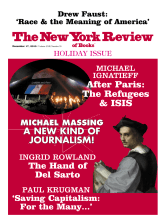In response to:
A Striptease Among Pals from the December 3, 2015 issue
To the Editors:
I usually tell my authors that writing letters in response to unfavorable reviews is a mug’s game, and here I am playing the mug.
I don’t object to Daniel Mendelsohn’s disliking my author Hanya Yanagihara’s novel A Little Life [NYR, December 3]. Fair’s fair in the critical sweepstakes, and it is a challenging and demanding book that asks a lot of its readers in respect to stamina and facing up to some ugly (imagined) facts. What I do object to, however, is his implication that my author has somehow, to use his word, “duped” its readers into feeling the emotions of pity and terror and sadness and compassion.
In the first place, as we all know and as Nabokov on numerous occasions was pleased to remind us, art is at bottom an elaborate con game, but one whose techniques are designed to lead us by degrees into a realm of authentic emotion and aesthetic bliss, which justifies the con. When I have felt like crying while reading a novel by Charles Dickens (take your pick) or, to cite a book in a wildly different register, John Williams’s Stoner, have I been “duped” by those authors? If so, I look forward to being duped in similar fashion many, many times in the future.
Mendelsohn also veers into very weird sociological territory when he suggests that A Little Life has somehow been cunningly fashioned to appeal to college students and recent graduates who have been coddled by a permissive and endlessly solicitous university culture into “see[ing] themselves not as agents in life but as potential victims.” Man up, young readers of America! This suggests that we should perhaps sticker the copies of A Little Life that we are shipping to college bookstores with the newly fashionable trigger warnings.
His assertion is wrong on two counts. In the first place at a hefty price of $30.00 full retail I doubt that A Little Life has found all that many buyers among the perennially cash-strapped postgraduate set. Secondly, I’ve received a simply extraordinary flood of e-mails from readers of, ahem, mature years, people who have been around the block and presumably made of sterner stuff than those putative softies, testifying to the powerful effect the book has had on them. Hardened souls and hard ones to dupe.
At bottom Mendelsohn seems to have decided that A Little Life just appeals to the wrong kind of reader. That’s an invidious distinction unworthy of a critic of his usually fine discernment.
Gerald Howard
Executive Editor, Doubleday
New York City
Daniel Mendelsohn replies:
It can be neither pleasant nor easy for Gerald Howard to have to defend his author’s now popular and acclaimed book against a complaint that he himself made as it was being written: that the preposterous excess of humiliation and suffering heaped on the protagonist by its author (along with the character’s improbable array of compensatory expertises) both defies verisimilitude and alienates the sensible reader. Here is Howard, as quoted in Kirkus Reviews:
It is perhaps inevitable that there would be some “tussles,” as Howard puts it, between him and Yanagihara about the published version of A Little Life. They were mainly about the punishment that Jude suffers. “This is just too hard for anybody to take,” Howard told her…. “You have made this point quite adequately, and I don’t think you need to do it again.” Yanagihara says that Howard also thought Jude was too unbelievably talented…. Not many passages that were up for cutting were cut.
My larger point was that Yanagihara’s slathering-on of trauma is, in the end, a crude and inartistic way of wringing emotion from the reader—an assaultive repetitiveness that can hardly claim to be one of the “techniques…designed to lead us by degrees into a realm of authentic emotion and aesthetic bliss” that Howard rightly mentions as a hallmark of a genuine novelistic achievement.
For this reason I believe Ms. Yanagihara achieves her effects dishonestly, which is obviously what I meant when I said she “dupes” her readers into the tears that Mr. Howard now brandishes as a sign of the book’s effectiveness—a reaction, whether from young or old, whose basis seems to me more therapeutic than aesthetic. I’m happy to allow that another word might be better than “duped”: “Cheated”? “Pandered to”? Mr. Howard can take his pick. One only wishes that he had imposed as stringent an editorial oversight on his author as he would do on her reviewers.



